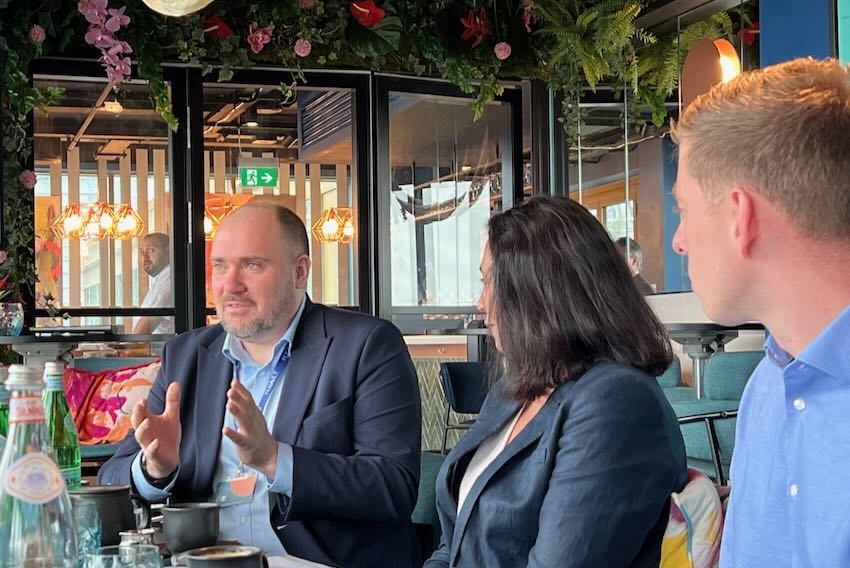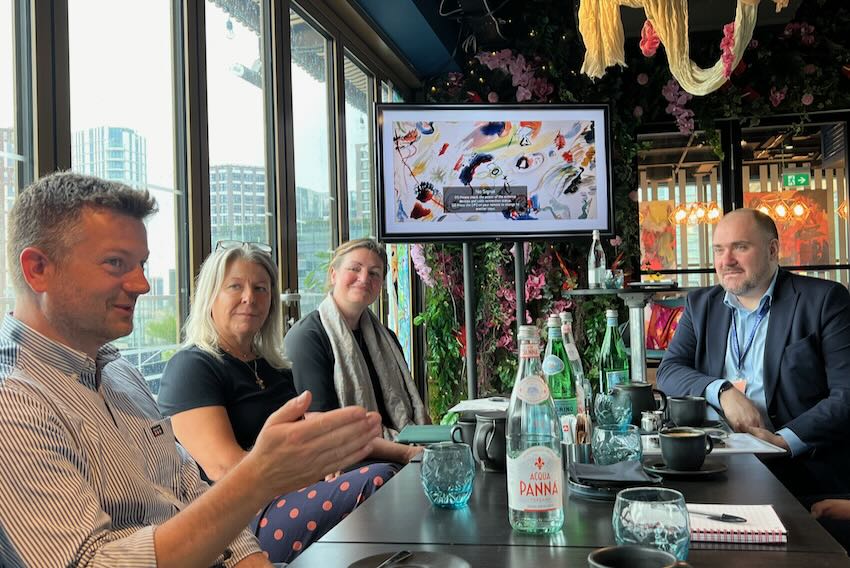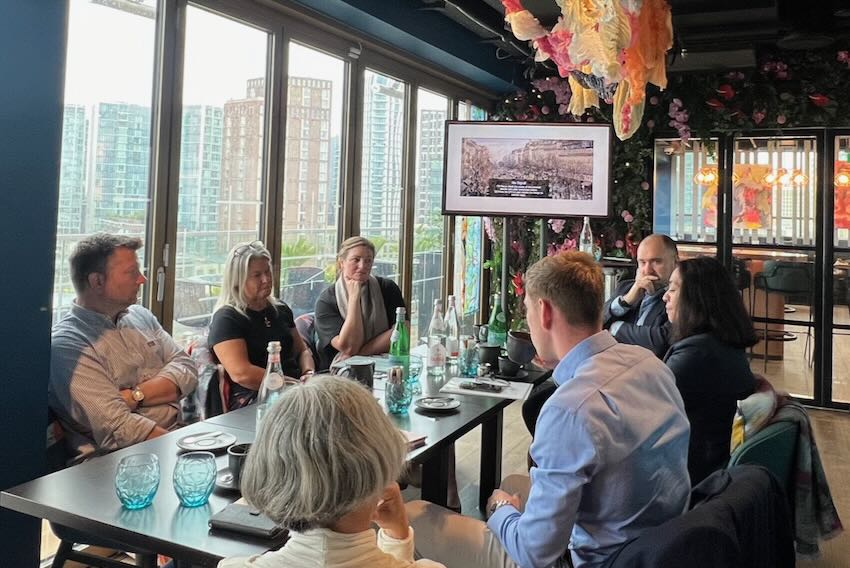
Felicity Cousins, editor of Sustainable Hotel News, launched Sustainability Bites with Michael Mason-Shaw, general manager of Hyatt Place London City East, to bring together experts across the hotel and sustainability sectors. Since we held the event and wrote this piece, Mason-Shaw has been appointed as regional director of operations Cycas hospitality UK. Pino Dispinseri takes on the role as general manager of Hyatt Place, London City East.
Hosted by Hyatt Place London City East, the inaugural Sustainability Bites event in early July saw a select group of leaders from the industry invited to a round table chat about the G of ESG.
Joining Michael Mason-Shaw and Felicity Cousins were; Ufi Ibrahim CEO of the Energy and Environment Alliance, Jamie Craze senior business analyst, Omnevue, Anjana Raza head of training and development, World Sustainable Hospitality Alliance, Paul Wells partner Studio Moren and Sarah Duncan ESG consultant and author.
Pocket Square is a modern, bright and airy event space on the 9th floor of the hotel, with doors opening onto the terrace. Although we chose July to host Sustainability Bites, the rain was falling fast, so we sat together binded by the subject and the evocative misty views across the east of the capital.
Sustainability Bites: It’s all about the G was born out of the idea that governance is often overlooked when talking about ESG. The E and the S are much more tangible in some ways, and yet it is the G which glues all these actions and practices together.

The big G and the little G
We began with the definition of governance in ESG and Duncan floated the idea of a hard G and a soft G. The big corporation with mandatory and legal compliance, which is all data driven, is the hard G and then there is the soft G, which is in the SME world. This soft G is voluntary and self-imposed around the S and E, which makes it more leadership and culture-led.
The idea of a hard and soft evolved to the big G and the small G during the round table and it became a key theme in the discussion. We often looped back to this idea and how it shaped the way businesses approached governance across the sector.
“Self imposed G is different from a mandated G,” added Duncan.
Omnevue’s Jamie Craze agreed: “I really like the distinction between the small G and the big G, and without effective governance you are not going to be able to make tangible progress with the E or the S.
“I also think there is a bridge between the small G and the big G because although the smaller businesses are not mandated at the moment they are getting caught up in the value chains of larger organisations and investors, and therefore CSRD and Sustainable Financial Disclosure Regulation (SFDR) on the investment side. Now we are seeing this at the corporate level and it’s starting to affect the SMEs.”
Before ESG there was CSR, and before that there was something else, so Craze pointed out although there has been an evolution, adhering to these frameworks “has historically been seen as exclusively a PR exercise to make a brand look better and this led to the advent of a huge amount of greenwashing, whereas now you are required to show high quality, usually verified data on top of that.”
The EEA’s Ibrahim said: “I think for big businesses it’s part of their DNA when it comes to financial governance, whereas the SMEs on the other hand don’t have the audit trails and it’s a voluntary adoption.”
Of course it will take time for the trickle down to impact on SMEs, for example with directives like the Corporate Sustainability Due Diligence Directive [CSDDD, which came into law in April this year], but banks will be putting more emphasis on finance grade auditing when it comes to the non financial, as well as the financial reporting.
Ibrahim added the high street banks would be the first to impact SMEs if they are not ready. “They will ask, where is your audited and assured non financial grade data? And that’s absolutely critical. And we welcome that because we think that’s the transformation that’s needed to shift the needle.”

Financial and non financial governance
The history of financial governance was key to the discussion. Without the Wall Street Crash and the Great Depression in the US there would not have been the move to global financial reporting standards, and ultimately the International Financial Reporting Standards (IFRS).
The entire world follows the standards set by the IFRS. Over the last five to ten years the IFRS has been acquiring global bodies for the ISSB (International Sustainability Standards Board) to bring all accounting standards together.
For example, the ISSB owns the intellectual property for the Task force on Climate related Financial Disclosures (TCFD) in the UK. It also owns the Task force on Nature related Financial Disclosures (TNFD).
Ibrahim explains that “already more than 54 countries around the world have mandated the ISSB sustainability reporting standards and they are interoperable with European Commission law such as CSRD, CSDDD, SFDR, etc.”
What sits behind all this is the International Organisation of Securities Commissions (IOSCO). This is made up of central banks and financial stock markets in every country, so it’s the financial community driving the non financial governance, and it’s the ISSB drafting it under global standards.
Everything is aligned with these global standards and regulators already taking the lead by committing to adopting disclosure rules based on the ISSB standards include the UK, Brazil, Mexico, Canada, Singapore, Hong Kong, and Japan.
How quickly are they moving? Pretty fast. IFRS S1 (sustainability-related financial disclosures) and IFRS S2 (climate-related disclosures) are designed to work together and are already set and being mandated into national government.
Work is currently being done on the reporting requirements for S3 (human capital) and S4 (biodiversity). But the point is, these are the global standards being set and everything will be aligned.
The EEA is working with the IFRS and ISSB and there is a timeline of 18 months to set industry-specific sector reporting standards. “These will become the global mandated reporting standards for hotels and lodging of all sizes.” Ibrahim explained.

Roadmaps and risk
The table agreed while the large companies with the big G will be on track, the SMEs may have a different pathway working out how they meet the requirements for some of the new regulations like CSRD and CSDDD.
So the question was put out – is governance data-driven to minimise risk? The tick box approach was seen as the weakest way to look at governance, but equally in order to minimise risk, those boxes do have to be ticked.
With the Hyatt Place London City East as an example, general manager Michael Mason-Shaw explained how ESG and the governance around it was “fundamental to the vision that we had for how we wanted to operate the building, and the business from the outset. So there was a clear path and a clear direction we created.”
Mason-Shaw worked with the asset management company at the time and Lissa Engle, managing director, Berkeley Capital Group.
“Lissa was absolutely fundamental to the success of our ESG roadmap – and having an expert within the organisation that we could lean on. To have the whole roadmap of the ESG interwoven into the C-suite – that was pretty much there from the absolute beginning.”
Mason-Shaw was keen to examine how this way of implementing ESG came from the small G rather than the big G: “I think in hotels we’ve always had the small G, and sustainability is at the heart of the way that we want to manage our hotels from an environmental perspective.
“If you think about hotels from an S, it’s fundamental to who we are. You’ve got stories of staff within the industry moving from a front office receptionist, to a director of sales, up to general manager and this way we have mobility within the industry from an S perspective.”

Education
It was agreed around the table that if SMES are not ready, then it comes down to education, and there needs to be a focus on sustainability reporting and awareness around this in the same way companies of any size think about, and govern, financial reporting.
Ibrahim said: “The really big missing piece is education, making them aware of the fact that it’s becoming a legal requirement. The French are way ahead. In France, if you are a director of a board, or director of a company if you are found to be misreporting financial or non financial data, you get a five year prison sentence. That’s the stick that the French have introduced.”
Currently in the United Kingdom there aren’t really any severe fines or prison sentences for misrepresentation of non financial reporting. There are on the financial side, but not on the non-financial side.
However, this is changing fast. Ibrahim believes SMEs will end up in hot water unless they get onboard. “The key question is how are we going to get SMEs to understand this so that we don’t end up with a lot of failures?”
Duncan thought there was a lack of alignment across the sector, which makes it hard for businesses to know which way to turn: “I’m reading a book called The Big Con [Mariana Mazzucato], which is all about big management consultancies. By 2018, there were already 600 different ESG frameworks. So it’s not surprising that people are a little bit confused, and a bit sceptical.”
Where will this harmonisation come from? We know it’s already being driven by the IFRS and ISSB, but one issue discussed was that non financial reporting hasn’t had its moment yet, there has been no critical tipping point, no crash, no moment of truth – and so there has been no “need” for a new and aligned system.
It’s almost as if we are waiting for this to happen before the “one” framework is enforced.
Duncan said: “Until we have that, people are going to be grappling around and the big boys are going to be looking for the reporting framework that best suits them, and the smaller ones are going to be saying ‘we don’t know what to do so we will pick this one’.
She added: “The last thing we want is for SMEs to be paralysed from action because suddenly these new compliance elements are taking up their time and not allowing them to be innovative and creative. But I absolutely agree that a framework is what is needed.”
There was a consensus that this lack of awareness must be temporary and some people have gone into ESG wanting to innovate and create and drive action but have found the reality is having to report data – and “sit in a dark room with a spreadsheet to tick a box.”
World Sustainable Hospitality Alliance’s Anjana Raza pointed out perhaps the most important aspect about governance is not how businesses use it, but why they need it in the first place.
“You have a nation therefore you need a government to manage it. So you have a business and what is the driver for setting up that governance in the first place? I think the question is why do we need to, because if we are just looking at governance and how we do it that can lead to greenwashing and I don’t see that going away.
“Even with all the best education coming in, whether it’s the execs, the frontline managers or the frontline staff. It’s the driver behind the governance that has to be addressed.”
There is an opportunity for ESG and science-based information becoming part of the conversation and part of actions if people are taught why.
ESG is out there but if a hotel member of staff is trying to make a living for their family, why are they interested in this. The key is to make it part of the job, to show why it is important for each individual.
Raza added: “There’s a huge focus on executive education as they have to know when sitting on the board but the opportunity is on the bottom level – It’s the ‘why’ that has to be told. That’s the biggest opportunity there right now.”
With this bottom-up approach hotels can have people on the ground, getting educated on circularity, understanding there is no such thing as waste. It’s here you get innovation and creativity and empowerment. This is more relatable than Net Zero.
Government standards are being set around non financial, as well as financial accounting, and the reality will soon kick in for SMEs.

Market share and branding
The discussion also touched on how ESG governance might impact on market share. Mason-Shaw asked if those hotels that have engaged with ESG and management “are garnering more market share as the big G becomes more predominant?”
Does the big G then have a positive impact on SMEs to get best practice and be more compliant – and do they then eat into the market share of that leader?
Duncan said: “The commerciality of this is probably the driving factor now rather than doing the right thing. But I like the idea of people getting behind it to get that ‘better business’ message sweeping through. I see more and more hotels understanding this all helps with employee retention and attraction so it all resonates.”
Paul Wells of Studio Moren agreed that the first driver is financial and the rest is a benefit: “Very few of our clients will do anything unless it impacts on them financially and they have to do it.”
He went on to explain that unlike Lissa Engle, Cycas Hospitality and Michael Mason-Shaw, who were invested in making a sustainable hotel from the beginning, a lot of clients are building hotels and then franchising them, so it’s not in their interest to make a building highly efficient, if they don’t need to, as they don’t get the rewards.
“A lot of our clients are still saying why would I go for BREEAM Outstanding when planning says I only need Good or Excellent? Or, why am I going through it at all on a refurb when I don’t need to?”
Wells acknowledged that Studio Moren is dealing with the big G more than the small G because of the guidance and tick boxes on BREEAM. Some hotels are taking this further, to plug into the wellbeing and responsible tourism offering for the market share, but how a sustainable building is used once it is built is out of the architects’ hands.
“As architects we can only take it so far. We can take the horse to water but we can’t change how someone operates. We could put in a beautiful building and they could fill it with plastic bottles,” said Wells.
He added that the biggest change over the last five years has been how previously a demolition was a financial decision, whereas now planners are asking to prove why a building needs to be demolished.
This is where the big G impacts, as eventually someone will say ‘you can’t buy that asset because it does not achieve the best sustainability level.’ Now people are asking ‘where will the asset be in five or ten years time?’
Clients will invest even if it’s a franchise as their asset will be worth 10 per cent more, will be future-proofed, and they are looking at the long term value. If the asset is worth more with renewable energy they are prepared to invest in that.
From the talk of BREEAM and ticking those boxes, the conversation moved naturally to certifications.

Certifications
From a guest point of view are they really interested in what sustainability certificate a hotel has, or are they more concerned about the numbers on emissions and sustainable practices a hotel may share, regardless?
It was agreed with more than 200 bodies offering sustainable certifications worldwide hotels may struggle to choose which one meets their needs. The language around certification is also causing a huge amount of noise and confusion.
Ibrahim pointed out there is already the GHG protocol in place which specifies how hotels should structure scope 1,2 3 emissions and that “there are very few who take it seriously on an audit basis.”
Omnevue’s Craze said: “Everyone is jumping on this word certification and hoping it’s going to carry weight, so without a centralised source of truth, which has to be mandated into international regulations, we will always have diverging standards. In the UK there is no regulation around one of these companies saying ‘this is an environmental certification’ – so it doesn’t mean anything.”
Studio Moren’s Wells noted operational certifications are more about LEED, and BREEAM will eventually get left behind. “I don’t think we’ll have BREEAM much longer because we are the only country with BREEAM. I think we are working more towards an international standard.”
Mason-Shaw said the big G has a massive impact on certifications: “What is driving that is the science-based targets. It all comes back to the financial institutions – you will have to prove you are reducing emissions year-on-year-out. There is a much more thorough checking of any data, so I do see the big G driving the certifications.”
The table discussed if certifications are more useful for marketing purposes, as a way to communicate sustainable practices, and there was also an acknowledgement that a few different certifications may be needed depending on the type of hotel and where it is, as well as what it wants to share.
Duncan said: “I think certification is all about marketing and you should think very carefully about it when you think about your reach. B Corp is great but you need B Corp plus something else, like Green Tourism and Green Key. So you might have a few certifications.”
Ibrahim argued that from a marketing perspective “if hotels want to be serious about verifying they need an audited ISO 5000 stamp [certification in Energy Management]. That is the only one that matters and nothing can match it.”
It was agreed that third party auditing was key to any single truth, but Mason-Shaw also noted part of the benefits of going through other certifications meant the team worked together and understood each other more, which he thought was an important part of governance.
“There is a bit of S in G. With this property we are going after EarthCheck – and it’s also a mechanism to galvanise the team. The data reporting was just three people but what is driving the data? You are seeing those people through the green team, through the framework of EarthCheck – so don’t underestimate the S in the G.”

After the discussion the hotel treated us to a taste of circularity with the chef providing us with a sustainable menu from leftover and surplus food from the kitchen. The menu included charred Cornish mackerel, delicious re-made sourdough bread, British garden salad, chalk stream trout brochette, pickled cabbage and a cheese and dessert course. The thought process behind this circular menu – to avoid food waste and re-purpose high quality ingredients in a different way – along with the careful presentation of all the dishes, was the perfect end to Sustainability Bites.
Key takeaways from Sustainability Bites: It’s all about the G
– There are different types of ways to look at governance – the big G with the box ticking and process for big corporations and the small G for SMEs fitting in, but all governance matters. And with regards to ESG it will all come down to making sure everyone has the right practices and reporting frameworks in place;
– Whether you respond to the carrot or the stick, all sustainability data should be treated as thoroughly as financial data;
– What are we waiting for? Are we waiting for the equivalent of the financial crash for the non-financial data reporting?;
– Certifications are currently useful for marketing and communicating sustainable practices, as well as galvanising a team to a common goal, but there needs to be one truth. One agreed standard and all third party audited;
– BREEAM may eventually be merged into one international standard;
– Education is key to the success of governance. We need to better communicate the why of sustainability to the hospitality sector from the bottom to the top;
– Communication around the business benefits of ESG compliance would be useful;
– Having KPIs and financial remuneration in place around ESG would help hotel teams, but very few have this system in place. 10-15 years ago hotels didn’t have the metrics for guests satisfaction scores, but once hotels have the metrics in place they can manage the KPIs and it becomes more ingrained. This will eventually happen with ESG.
With thanks to the attendees of the inaugural Sustainability Bites for a fine discussion on governance, and to Michael Mason-Shaw and the team at Hyatt Place London City East.
Photos: Esther Bell

